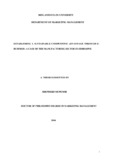Please use this identifier to cite or link to this item:
https://cris.library.msu.ac.zw//handle/11408/2883Full metadata record
| DC Field | Value | Language |
|---|---|---|
| dc.contributor.author | Mupemhi, Shepherd | - |
| dc.date.accessioned | 2017-09-21T16:42:31Z | - |
| dc.date.available | 2017-09-21T16:42:31Z | - |
| dc.date.issued | 2016 | - |
| dc.identifier.uri | http://hdl.handle.net/11408/2883 | - |
| dc.description.abstract | Manufacturing firms, the world over, are confronted with the need to improve the quality of their products while at the same time containing costs (Barden, Whitaker and Mithas, 2013). This has driven most firms in the developed countries to adopt e-business in order to remain competitive (Rangathan, Dhaliwal and Teo (2004). However, there is little empirical evidence in developing countries linking e-business adoption and firm efficiency. The study investigates the factors affecting the adoption of e-business by the manufacturing firms in Zimbabwe. It further seeks to establish the consequences of e-business adoption on firm’s business efficiency and sustainable competitive advantage. A pragmatic philosophical approach involving the use of the exploratory, descriptive and explanatory research designs is adopted to fully answer the research objectives. Quantitative data were obtained from 118 respondents using a survey. These were drawn from 170 manufacturing firms on the 2012 Confederation of Zimbabwe Industries (CZI) membership list using systematic random sampling method. The results from the quantitative phase were complimented by the qualitative data obtained using in-depth interviews. The results substantiate the significance of institutional factors, innovation orientation, financial resources, size of the firm, perceived usefulness and managerial attitudes as drivers of e-business adoption. In addition, number of e-business applications adopted by the firm and their usage rate are found to have positive impact on business efficiency and sustainable competitive advantage of the firm. Finally, the results show a positive relationship between the firm’s business efficiency and its organisational and strategic sustainable competitive advantage. The study furthers current debate on e-business adoption by identifying the drivers of e-business adoption in the manufacturing sector in a developing country. Furthermore, the study makes a contribution to new knowledge by identifying the mediating variables in e-business adoption that generate e-business efficiency. It further develops a new e-business adoption model linking the antecedents of e-business adoption with business efficiency and sustainable competitive advantage. | en_US |
| dc.language.iso | en | en_US |
| dc.publisher | Midlands State University | en_US |
| dc.subject | E-business | en_US |
| dc.subject | E-business adoption | en_US |
| dc.subject | E-business applications | en_US |
| dc.subject | E-business efficiency | en_US |
| dc.subject | Sustainable competitive advantage | en_US |
| dc.subject | Manufacturing sector | en_US |
| dc.title | Establishing a sustainable competitive advantage through e-business: a case of the manufacturing sector in Zimbabwe | en_US |
| dc.type | Thesis | en_US |
| item.cerifentitytype | Publications | - |
| item.openairecristype | http://purl.org/coar/resource_type/c_18cf | - |
| item.languageiso639-1 | en | - |
| item.openairetype | Thesis | - |
| item.fulltext | With Fulltext | - |
| item.grantfulltext | open | - |
| Appears in Collections: | Theses | |
Files in This Item:
| File | Description | Size | Format | |
|---|---|---|---|---|
| Mupemhi thesis-1..pdf | Full Text | 2.63 MB | Adobe PDF |  View/Open |
Page view(s)
280
checked on Jan 29, 2026
Download(s)
298
checked on Jan 29, 2026
Google ScholarTM
Check
Items in MSUIR are protected by copyright, with all rights reserved, unless otherwise indicated.



